Marketing Strategy & Growth: A Coca-Cola Nigeria Case Study Analysis
VerifiedAdded on 2023/06/14
|9
|2681
|199
Case Study
AI Summary
This case study explores Coca-Cola's marketing strategies in Nigeria, focusing on the role of marketing in achieving organizational goals and delivering perceived value to customers. It discusses how being market-oriented and delivering perceived value impacted the planning, formulation, and implementation of effective marketing strategies for Coca-Cola's growth in Nigeria. The analysis covers various aspects of Coca-Cola's marketing approach, including meeting customer needs, ensuring organizational growth, adapting pricing strategies, and enhancing perceived value through design aesthetics, quality, and social responsibility. Furthermore, the study examines the impact of market orientation on strategy formulation and implementation, emphasizing the importance of understanding customer preferences and market trends. Finally, the role of delivering perceived value to consumers in creating long-term customer loyalty and driving business growth through integrated marketing channels is highlighted, underscoring Coca-Cola's success in the Nigerian market.
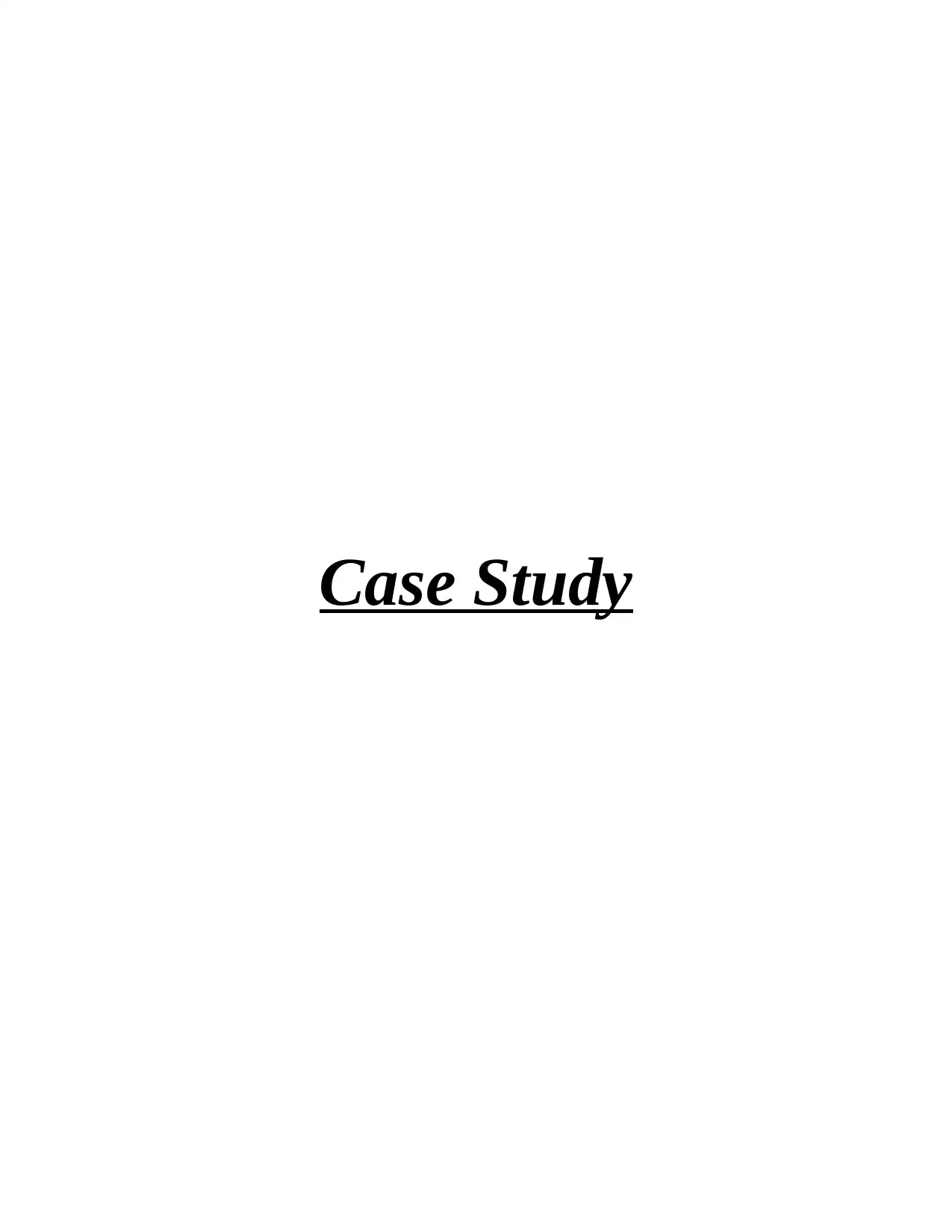
Case Study
Paraphrase This Document
Need a fresh take? Get an instant paraphrase of this document with our AI Paraphraser
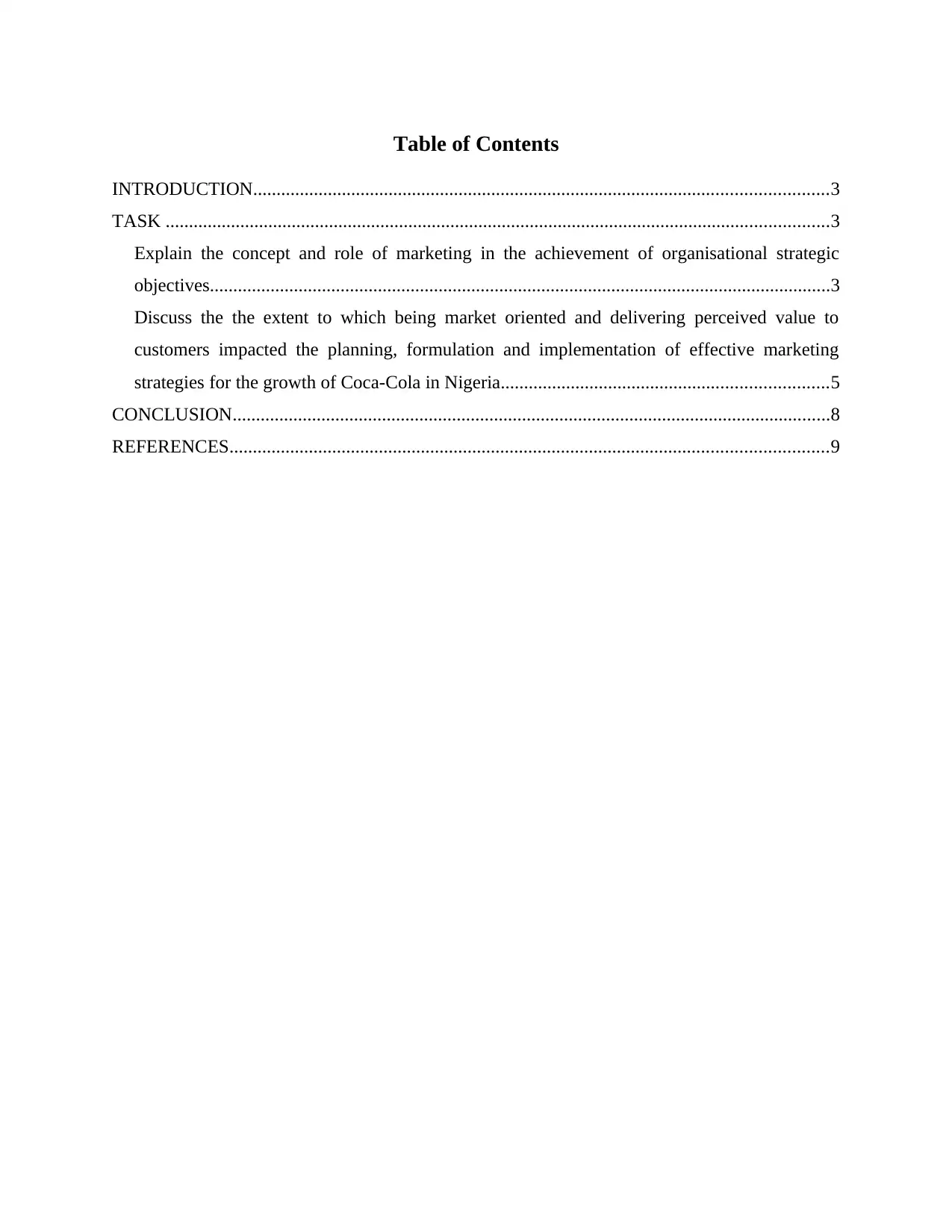
Table of Contents
INTRODUCTION...........................................................................................................................3
TASK ..............................................................................................................................................3
Explain the concept and role of marketing in the achievement of organisational strategic
objectives.....................................................................................................................................3
Discuss the the extent to which being market oriented and delivering perceived value to
customers impacted the planning, formulation and implementation of effective marketing
strategies for the growth of Coca-Cola in Nigeria......................................................................5
CONCLUSION................................................................................................................................8
REFERENCES................................................................................................................................9
INTRODUCTION...........................................................................................................................3
TASK ..............................................................................................................................................3
Explain the concept and role of marketing in the achievement of organisational strategic
objectives.....................................................................................................................................3
Discuss the the extent to which being market oriented and delivering perceived value to
customers impacted the planning, formulation and implementation of effective marketing
strategies for the growth of Coca-Cola in Nigeria......................................................................5
CONCLUSION................................................................................................................................8
REFERENCES................................................................................................................................9
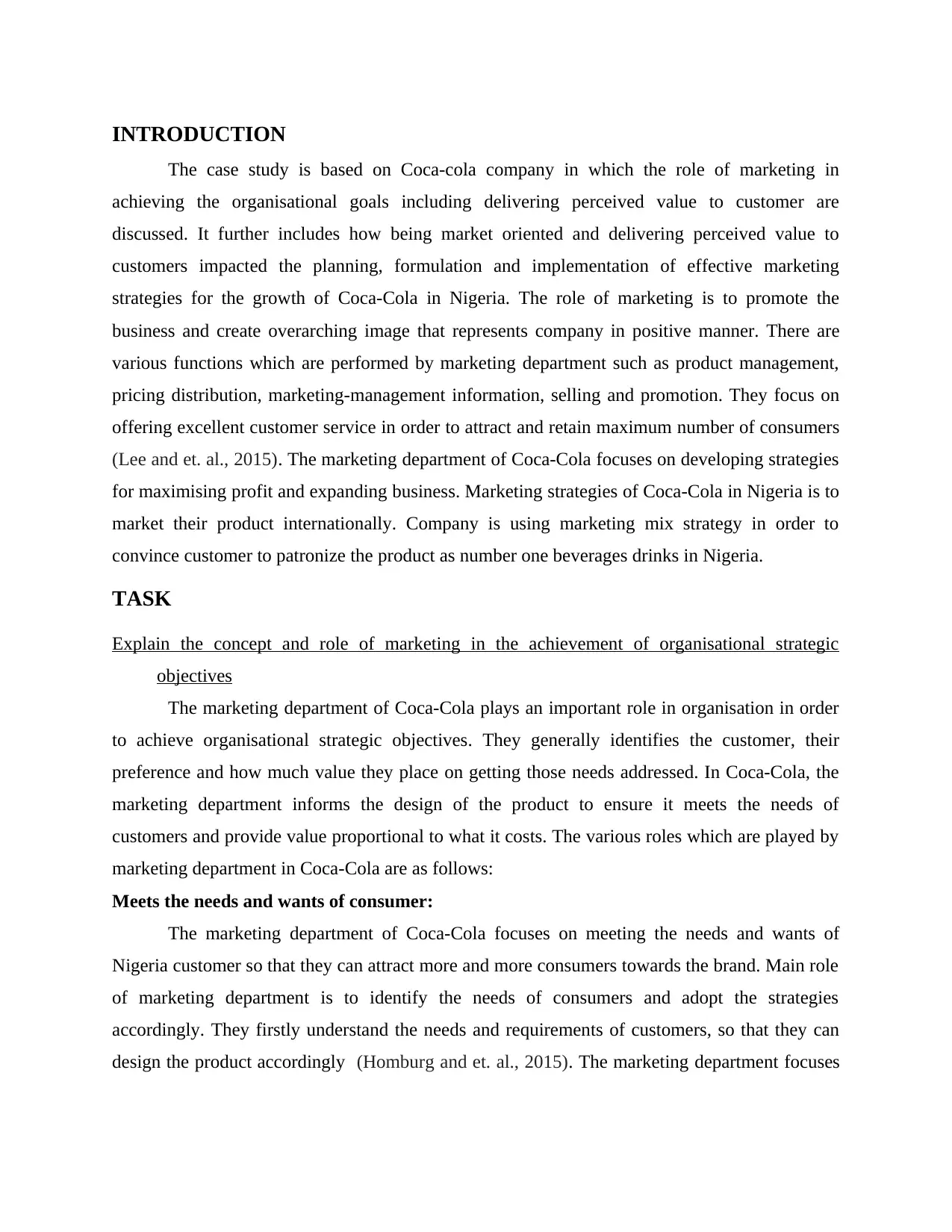
INTRODUCTION
The case study is based on Coca-cola company in which the role of marketing in
achieving the organisational goals including delivering perceived value to customer are
discussed. It further includes how being market oriented and delivering perceived value to
customers impacted the planning, formulation and implementation of effective marketing
strategies for the growth of Coca-Cola in Nigeria. The role of marketing is to promote the
business and create overarching image that represents company in positive manner. There are
various functions which are performed by marketing department such as product management,
pricing distribution, marketing-management information, selling and promotion. They focus on
offering excellent customer service in order to attract and retain maximum number of consumers
(Lee and et. al., 2015). The marketing department of Coca-Cola focuses on developing strategies
for maximising profit and expanding business. Marketing strategies of Coca-Cola in Nigeria is to
market their product internationally. Company is using marketing mix strategy in order to
convince customer to patronize the product as number one beverages drinks in Nigeria.
TASK
Explain the concept and role of marketing in the achievement of organisational strategic
objectives
The marketing department of Coca-Cola plays an important role in organisation in order
to achieve organisational strategic objectives. They generally identifies the customer, their
preference and how much value they place on getting those needs addressed. In Coca-Cola, the
marketing department informs the design of the product to ensure it meets the needs of
customers and provide value proportional to what it costs. The various roles which are played by
marketing department in Coca-Cola are as follows:
Meets the needs and wants of consumer:
The marketing department of Coca-Cola focuses on meeting the needs and wants of
Nigeria customer so that they can attract more and more consumers towards the brand. Main role
of marketing department is to identify the needs of consumers and adopt the strategies
accordingly. They firstly understand the needs and requirements of customers, so that they can
design the product accordingly (Homburg and et. al., 2015). The marketing department focuses
The case study is based on Coca-cola company in which the role of marketing in
achieving the organisational goals including delivering perceived value to customer are
discussed. It further includes how being market oriented and delivering perceived value to
customers impacted the planning, formulation and implementation of effective marketing
strategies for the growth of Coca-Cola in Nigeria. The role of marketing is to promote the
business and create overarching image that represents company in positive manner. There are
various functions which are performed by marketing department such as product management,
pricing distribution, marketing-management information, selling and promotion. They focus on
offering excellent customer service in order to attract and retain maximum number of consumers
(Lee and et. al., 2015). The marketing department of Coca-Cola focuses on developing strategies
for maximising profit and expanding business. Marketing strategies of Coca-Cola in Nigeria is to
market their product internationally. Company is using marketing mix strategy in order to
convince customer to patronize the product as number one beverages drinks in Nigeria.
TASK
Explain the concept and role of marketing in the achievement of organisational strategic
objectives
The marketing department of Coca-Cola plays an important role in organisation in order
to achieve organisational strategic objectives. They generally identifies the customer, their
preference and how much value they place on getting those needs addressed. In Coca-Cola, the
marketing department informs the design of the product to ensure it meets the needs of
customers and provide value proportional to what it costs. The various roles which are played by
marketing department in Coca-Cola are as follows:
Meets the needs and wants of consumer:
The marketing department of Coca-Cola focuses on meeting the needs and wants of
Nigeria customer so that they can attract more and more consumers towards the brand. Main role
of marketing department is to identify the needs of consumers and adopt the strategies
accordingly. They firstly understand the needs and requirements of customers, so that they can
design the product accordingly (Homburg and et. al., 2015). The marketing department focuses
⊘ This is a preview!⊘
Do you want full access?
Subscribe today to unlock all pages.

Trusted by 1+ million students worldwide
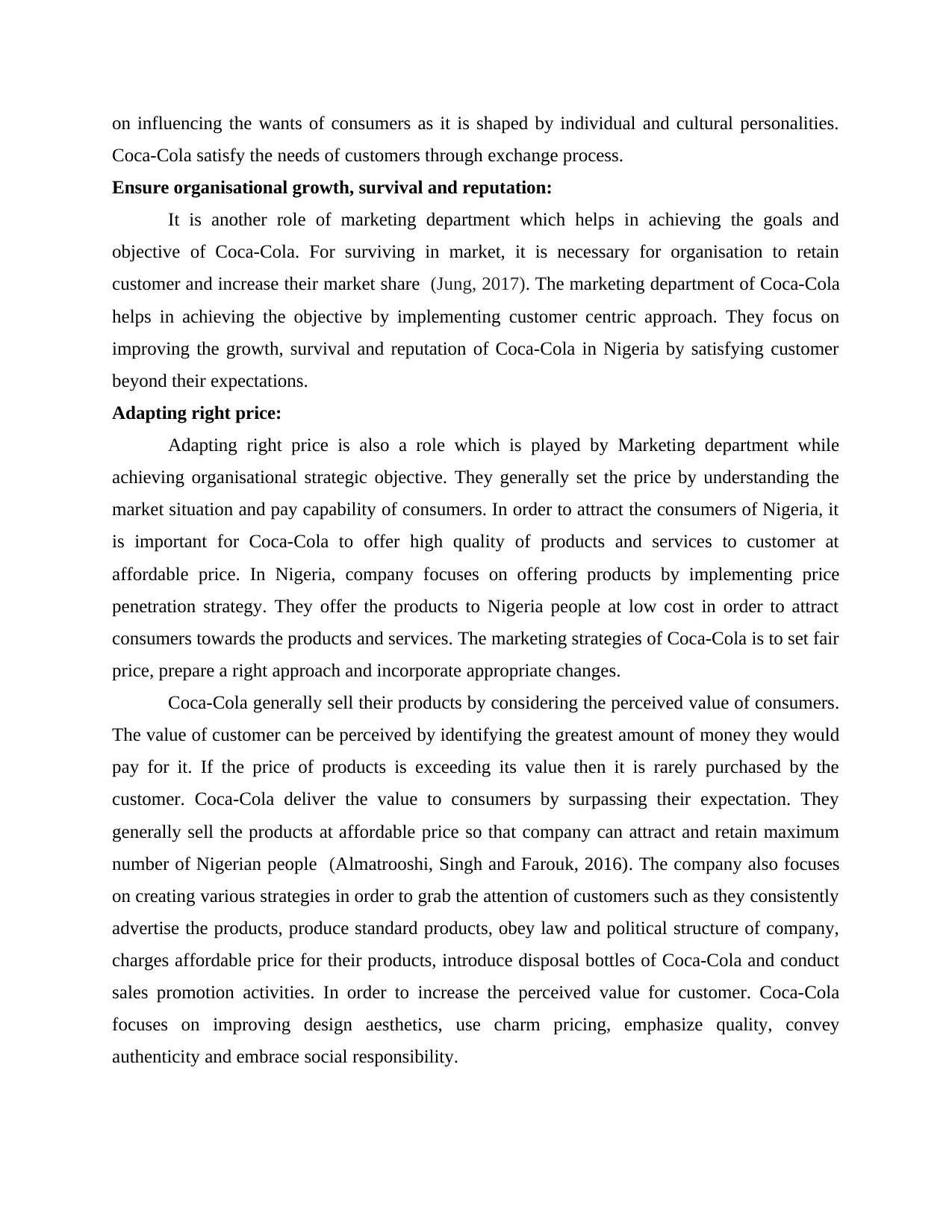
on influencing the wants of consumers as it is shaped by individual and cultural personalities.
Coca-Cola satisfy the needs of customers through exchange process.
Ensure organisational growth, survival and reputation:
It is another role of marketing department which helps in achieving the goals and
objective of Coca-Cola. For surviving in market, it is necessary for organisation to retain
customer and increase their market share (Jung, 2017). The marketing department of Coca-Cola
helps in achieving the objective by implementing customer centric approach. They focus on
improving the growth, survival and reputation of Coca-Cola in Nigeria by satisfying customer
beyond their expectations.
Adapting right price:
Adapting right price is also a role which is played by Marketing department while
achieving organisational strategic objective. They generally set the price by understanding the
market situation and pay capability of consumers. In order to attract the consumers of Nigeria, it
is important for Coca-Cola to offer high quality of products and services to customer at
affordable price. In Nigeria, company focuses on offering products by implementing price
penetration strategy. They offer the products to Nigeria people at low cost in order to attract
consumers towards the products and services. The marketing strategies of Coca-Cola is to set fair
price, prepare a right approach and incorporate appropriate changes.
Coca-Cola generally sell their products by considering the perceived value of consumers.
The value of customer can be perceived by identifying the greatest amount of money they would
pay for it. If the price of products is exceeding its value then it is rarely purchased by the
customer. Coca-Cola deliver the value to consumers by surpassing their expectation. They
generally sell the products at affordable price so that company can attract and retain maximum
number of Nigerian people (Almatrooshi, Singh and Farouk, 2016). The company also focuses
on creating various strategies in order to grab the attention of customers such as they consistently
advertise the products, produce standard products, obey law and political structure of company,
charges affordable price for their products, introduce disposal bottles of Coca-Cola and conduct
sales promotion activities. In order to increase the perceived value for customer. Coca-Cola
focuses on improving design aesthetics, use charm pricing, emphasize quality, convey
authenticity and embrace social responsibility.
Coca-Cola satisfy the needs of customers through exchange process.
Ensure organisational growth, survival and reputation:
It is another role of marketing department which helps in achieving the goals and
objective of Coca-Cola. For surviving in market, it is necessary for organisation to retain
customer and increase their market share (Jung, 2017). The marketing department of Coca-Cola
helps in achieving the objective by implementing customer centric approach. They focus on
improving the growth, survival and reputation of Coca-Cola in Nigeria by satisfying customer
beyond their expectations.
Adapting right price:
Adapting right price is also a role which is played by Marketing department while
achieving organisational strategic objective. They generally set the price by understanding the
market situation and pay capability of consumers. In order to attract the consumers of Nigeria, it
is important for Coca-Cola to offer high quality of products and services to customer at
affordable price. In Nigeria, company focuses on offering products by implementing price
penetration strategy. They offer the products to Nigeria people at low cost in order to attract
consumers towards the products and services. The marketing strategies of Coca-Cola is to set fair
price, prepare a right approach and incorporate appropriate changes.
Coca-Cola generally sell their products by considering the perceived value of consumers.
The value of customer can be perceived by identifying the greatest amount of money they would
pay for it. If the price of products is exceeding its value then it is rarely purchased by the
customer. Coca-Cola deliver the value to consumers by surpassing their expectation. They
generally sell the products at affordable price so that company can attract and retain maximum
number of Nigerian people (Almatrooshi, Singh and Farouk, 2016). The company also focuses
on creating various strategies in order to grab the attention of customers such as they consistently
advertise the products, produce standard products, obey law and political structure of company,
charges affordable price for their products, introduce disposal bottles of Coca-Cola and conduct
sales promotion activities. In order to increase the perceived value for customer. Coca-Cola
focuses on improving design aesthetics, use charm pricing, emphasize quality, convey
authenticity and embrace social responsibility.
Paraphrase This Document
Need a fresh take? Get an instant paraphrase of this document with our AI Paraphraser
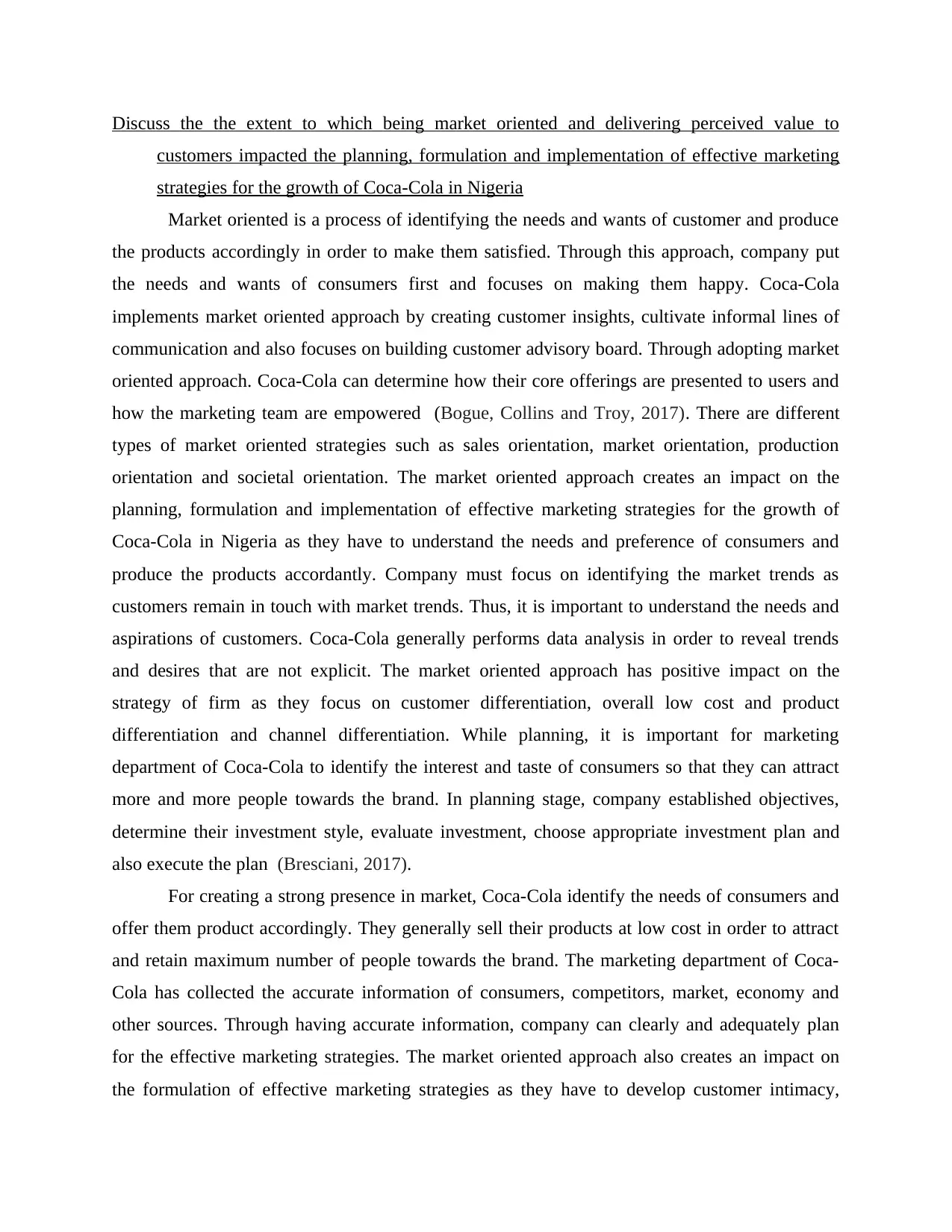
Discuss the the extent to which being market oriented and delivering perceived value to
customers impacted the planning, formulation and implementation of effective marketing
strategies for the growth of Coca-Cola in Nigeria
Market oriented is a process of identifying the needs and wants of customer and produce
the products accordingly in order to make them satisfied. Through this approach, company put
the needs and wants of consumers first and focuses on making them happy. Coca-Cola
implements market oriented approach by creating customer insights, cultivate informal lines of
communication and also focuses on building customer advisory board. Through adopting market
oriented approach. Coca-Cola can determine how their core offerings are presented to users and
how the marketing team are empowered (Bogue, Collins and Troy, 2017). There are different
types of market oriented strategies such as sales orientation, market orientation, production
orientation and societal orientation. The market oriented approach creates an impact on the
planning, formulation and implementation of effective marketing strategies for the growth of
Coca-Cola in Nigeria as they have to understand the needs and preference of consumers and
produce the products accordantly. Company must focus on identifying the market trends as
customers remain in touch with market trends. Thus, it is important to understand the needs and
aspirations of customers. Coca-Cola generally performs data analysis in order to reveal trends
and desires that are not explicit. The market oriented approach has positive impact on the
strategy of firm as they focus on customer differentiation, overall low cost and product
differentiation and channel differentiation. While planning, it is important for marketing
department of Coca-Cola to identify the interest and taste of consumers so that they can attract
more and more people towards the brand. In planning stage, company established objectives,
determine their investment style, evaluate investment, choose appropriate investment plan and
also execute the plan (Bresciani, 2017).
For creating a strong presence in market, Coca-Cola identify the needs of consumers and
offer them product accordingly. They generally sell their products at low cost in order to attract
and retain maximum number of people towards the brand. The marketing department of Coca-
Cola has collected the accurate information of consumers, competitors, market, economy and
other sources. Through having accurate information, company can clearly and adequately plan
for the effective marketing strategies. The market oriented approach also creates an impact on
the formulation of effective marketing strategies as they have to develop customer intimacy,
customers impacted the planning, formulation and implementation of effective marketing
strategies for the growth of Coca-Cola in Nigeria
Market oriented is a process of identifying the needs and wants of customer and produce
the products accordingly in order to make them satisfied. Through this approach, company put
the needs and wants of consumers first and focuses on making them happy. Coca-Cola
implements market oriented approach by creating customer insights, cultivate informal lines of
communication and also focuses on building customer advisory board. Through adopting market
oriented approach. Coca-Cola can determine how their core offerings are presented to users and
how the marketing team are empowered (Bogue, Collins and Troy, 2017). There are different
types of market oriented strategies such as sales orientation, market orientation, production
orientation and societal orientation. The market oriented approach creates an impact on the
planning, formulation and implementation of effective marketing strategies for the growth of
Coca-Cola in Nigeria as they have to understand the needs and preference of consumers and
produce the products accordantly. Company must focus on identifying the market trends as
customers remain in touch with market trends. Thus, it is important to understand the needs and
aspirations of customers. Coca-Cola generally performs data analysis in order to reveal trends
and desires that are not explicit. The market oriented approach has positive impact on the
strategy of firm as they focus on customer differentiation, overall low cost and product
differentiation and channel differentiation. While planning, it is important for marketing
department of Coca-Cola to identify the interest and taste of consumers so that they can attract
more and more people towards the brand. In planning stage, company established objectives,
determine their investment style, evaluate investment, choose appropriate investment plan and
also execute the plan (Bresciani, 2017).
For creating a strong presence in market, Coca-Cola identify the needs of consumers and
offer them product accordingly. They generally sell their products at low cost in order to attract
and retain maximum number of people towards the brand. The marketing department of Coca-
Cola has collected the accurate information of consumers, competitors, market, economy and
other sources. Through having accurate information, company can clearly and adequately plan
for the effective marketing strategies. The market oriented approach also creates an impact on
the formulation of effective marketing strategies as they have to develop customer intimacy,
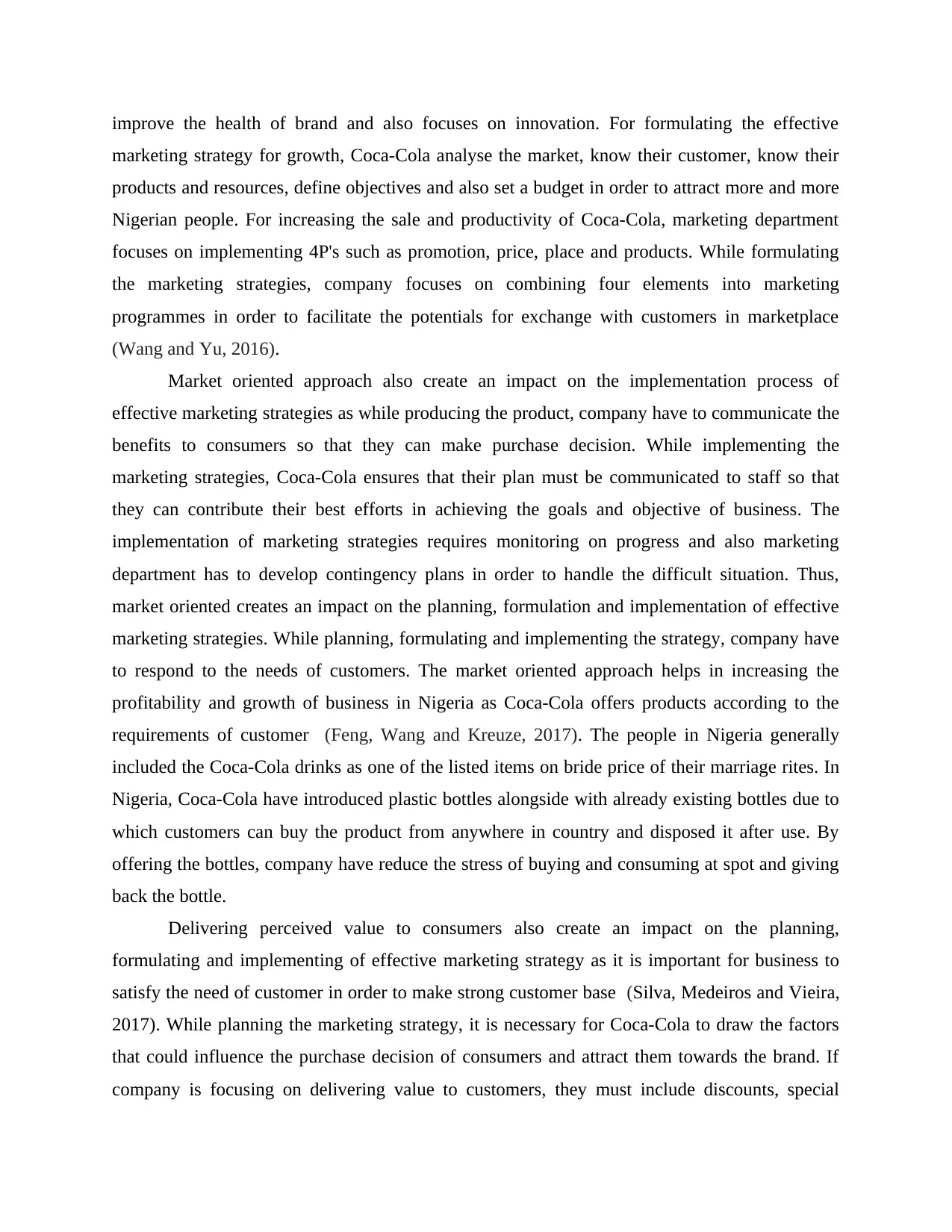
improve the health of brand and also focuses on innovation. For formulating the effective
marketing strategy for growth, Coca-Cola analyse the market, know their customer, know their
products and resources, define objectives and also set a budget in order to attract more and more
Nigerian people. For increasing the sale and productivity of Coca-Cola, marketing department
focuses on implementing 4P's such as promotion, price, place and products. While formulating
the marketing strategies, company focuses on combining four elements into marketing
programmes in order to facilitate the potentials for exchange with customers in marketplace
(Wang and Yu, 2016).
Market oriented approach also create an impact on the implementation process of
effective marketing strategies as while producing the product, company have to communicate the
benefits to consumers so that they can make purchase decision. While implementing the
marketing strategies, Coca-Cola ensures that their plan must be communicated to staff so that
they can contribute their best efforts in achieving the goals and objective of business. The
implementation of marketing strategies requires monitoring on progress and also marketing
department has to develop contingency plans in order to handle the difficult situation. Thus,
market oriented creates an impact on the planning, formulation and implementation of effective
marketing strategies. While planning, formulating and implementing the strategy, company have
to respond to the needs of customers. The market oriented approach helps in increasing the
profitability and growth of business in Nigeria as Coca-Cola offers products according to the
requirements of customer (Feng, Wang and Kreuze, 2017). The people in Nigeria generally
included the Coca-Cola drinks as one of the listed items on bride price of their marriage rites. In
Nigeria, Coca-Cola have introduced plastic bottles alongside with already existing bottles due to
which customers can buy the product from anywhere in country and disposed it after use. By
offering the bottles, company have reduce the stress of buying and consuming at spot and giving
back the bottle.
Delivering perceived value to consumers also create an impact on the planning,
formulating and implementing of effective marketing strategy as it is important for business to
satisfy the need of customer in order to make strong customer base (Silva, Medeiros and Vieira,
2017). While planning the marketing strategy, it is necessary for Coca-Cola to draw the factors
that could influence the purchase decision of consumers and attract them towards the brand. If
company is focusing on delivering value to customers, they must include discounts, special
marketing strategy for growth, Coca-Cola analyse the market, know their customer, know their
products and resources, define objectives and also set a budget in order to attract more and more
Nigerian people. For increasing the sale and productivity of Coca-Cola, marketing department
focuses on implementing 4P's such as promotion, price, place and products. While formulating
the marketing strategies, company focuses on combining four elements into marketing
programmes in order to facilitate the potentials for exchange with customers in marketplace
(Wang and Yu, 2016).
Market oriented approach also create an impact on the implementation process of
effective marketing strategies as while producing the product, company have to communicate the
benefits to consumers so that they can make purchase decision. While implementing the
marketing strategies, Coca-Cola ensures that their plan must be communicated to staff so that
they can contribute their best efforts in achieving the goals and objective of business. The
implementation of marketing strategies requires monitoring on progress and also marketing
department has to develop contingency plans in order to handle the difficult situation. Thus,
market oriented creates an impact on the planning, formulation and implementation of effective
marketing strategies. While planning, formulating and implementing the strategy, company have
to respond to the needs of customers. The market oriented approach helps in increasing the
profitability and growth of business in Nigeria as Coca-Cola offers products according to the
requirements of customer (Feng, Wang and Kreuze, 2017). The people in Nigeria generally
included the Coca-Cola drinks as one of the listed items on bride price of their marriage rites. In
Nigeria, Coca-Cola have introduced plastic bottles alongside with already existing bottles due to
which customers can buy the product from anywhere in country and disposed it after use. By
offering the bottles, company have reduce the stress of buying and consuming at spot and giving
back the bottle.
Delivering perceived value to consumers also create an impact on the planning,
formulating and implementing of effective marketing strategy as it is important for business to
satisfy the need of customer in order to make strong customer base (Silva, Medeiros and Vieira,
2017). While planning the marketing strategy, it is necessary for Coca-Cola to draw the factors
that could influence the purchase decision of consumers and attract them towards the brand. If
company is focusing on delivering value to customers, they must include discounts, special
⊘ This is a preview!⊘
Do you want full access?
Subscribe today to unlock all pages.

Trusted by 1+ million students worldwide
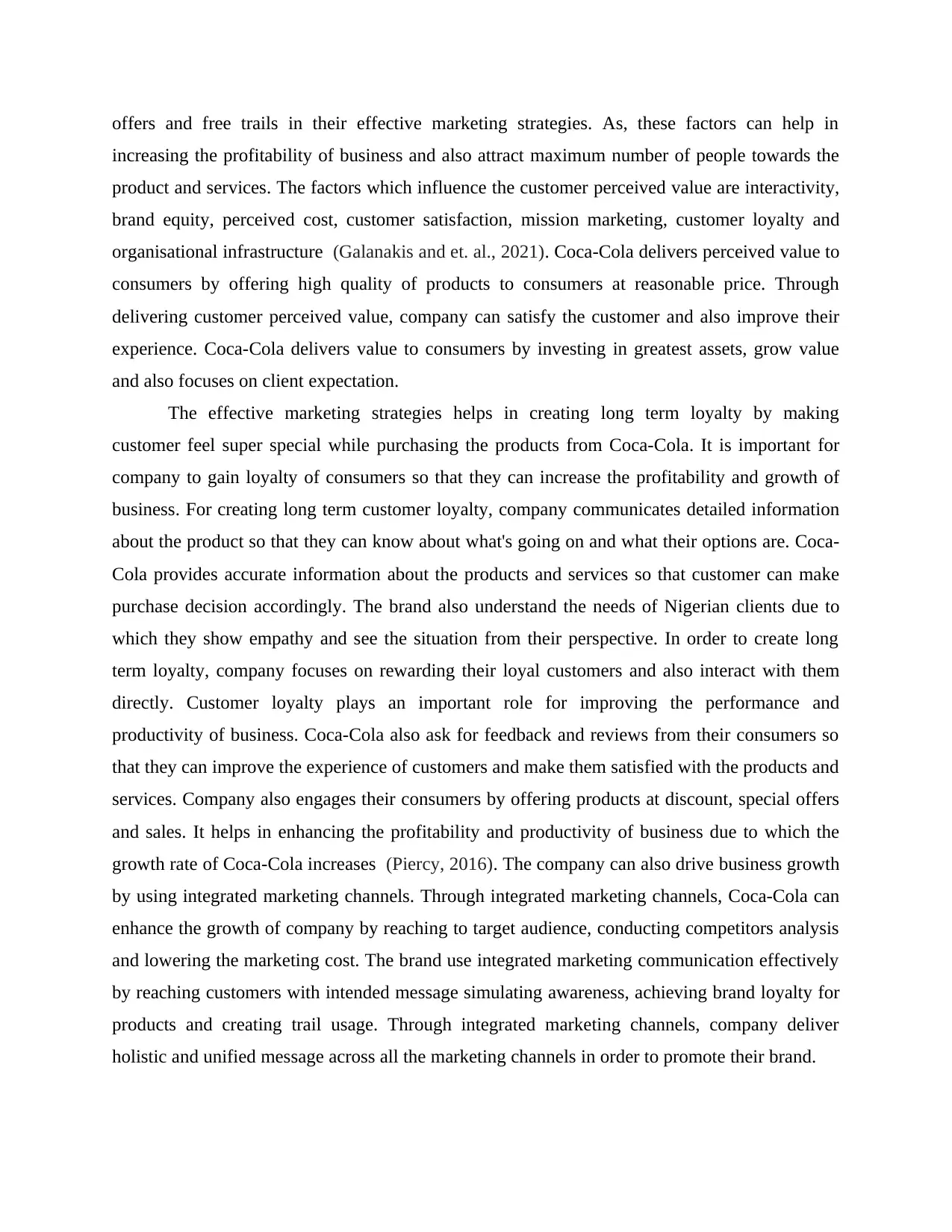
offers and free trails in their effective marketing strategies. As, these factors can help in
increasing the profitability of business and also attract maximum number of people towards the
product and services. The factors which influence the customer perceived value are interactivity,
brand equity, perceived cost, customer satisfaction, mission marketing, customer loyalty and
organisational infrastructure (Galanakis and et. al., 2021). Coca-Cola delivers perceived value to
consumers by offering high quality of products to consumers at reasonable price. Through
delivering customer perceived value, company can satisfy the customer and also improve their
experience. Coca-Cola delivers value to consumers by investing in greatest assets, grow value
and also focuses on client expectation.
The effective marketing strategies helps in creating long term loyalty by making
customer feel super special while purchasing the products from Coca-Cola. It is important for
company to gain loyalty of consumers so that they can increase the profitability and growth of
business. For creating long term customer loyalty, company communicates detailed information
about the product so that they can know about what's going on and what their options are. Coca-
Cola provides accurate information about the products and services so that customer can make
purchase decision accordingly. The brand also understand the needs of Nigerian clients due to
which they show empathy and see the situation from their perspective. In order to create long
term loyalty, company focuses on rewarding their loyal customers and also interact with them
directly. Customer loyalty plays an important role for improving the performance and
productivity of business. Coca-Cola also ask for feedback and reviews from their consumers so
that they can improve the experience of customers and make them satisfied with the products and
services. Company also engages their consumers by offering products at discount, special offers
and sales. It helps in enhancing the profitability and productivity of business due to which the
growth rate of Coca-Cola increases (Piercy, 2016). The company can also drive business growth
by using integrated marketing channels. Through integrated marketing channels, Coca-Cola can
enhance the growth of company by reaching to target audience, conducting competitors analysis
and lowering the marketing cost. The brand use integrated marketing communication effectively
by reaching customers with intended message simulating awareness, achieving brand loyalty for
products and creating trail usage. Through integrated marketing channels, company deliver
holistic and unified message across all the marketing channels in order to promote their brand.
increasing the profitability of business and also attract maximum number of people towards the
product and services. The factors which influence the customer perceived value are interactivity,
brand equity, perceived cost, customer satisfaction, mission marketing, customer loyalty and
organisational infrastructure (Galanakis and et. al., 2021). Coca-Cola delivers perceived value to
consumers by offering high quality of products to consumers at reasonable price. Through
delivering customer perceived value, company can satisfy the customer and also improve their
experience. Coca-Cola delivers value to consumers by investing in greatest assets, grow value
and also focuses on client expectation.
The effective marketing strategies helps in creating long term loyalty by making
customer feel super special while purchasing the products from Coca-Cola. It is important for
company to gain loyalty of consumers so that they can increase the profitability and growth of
business. For creating long term customer loyalty, company communicates detailed information
about the product so that they can know about what's going on and what their options are. Coca-
Cola provides accurate information about the products and services so that customer can make
purchase decision accordingly. The brand also understand the needs of Nigerian clients due to
which they show empathy and see the situation from their perspective. In order to create long
term loyalty, company focuses on rewarding their loyal customers and also interact with them
directly. Customer loyalty plays an important role for improving the performance and
productivity of business. Coca-Cola also ask for feedback and reviews from their consumers so
that they can improve the experience of customers and make them satisfied with the products and
services. Company also engages their consumers by offering products at discount, special offers
and sales. It helps in enhancing the profitability and productivity of business due to which the
growth rate of Coca-Cola increases (Piercy, 2016). The company can also drive business growth
by using integrated marketing channels. Through integrated marketing channels, Coca-Cola can
enhance the growth of company by reaching to target audience, conducting competitors analysis
and lowering the marketing cost. The brand use integrated marketing communication effectively
by reaching customers with intended message simulating awareness, achieving brand loyalty for
products and creating trail usage. Through integrated marketing channels, company deliver
holistic and unified message across all the marketing channels in order to promote their brand.
Paraphrase This Document
Need a fresh take? Get an instant paraphrase of this document with our AI Paraphraser
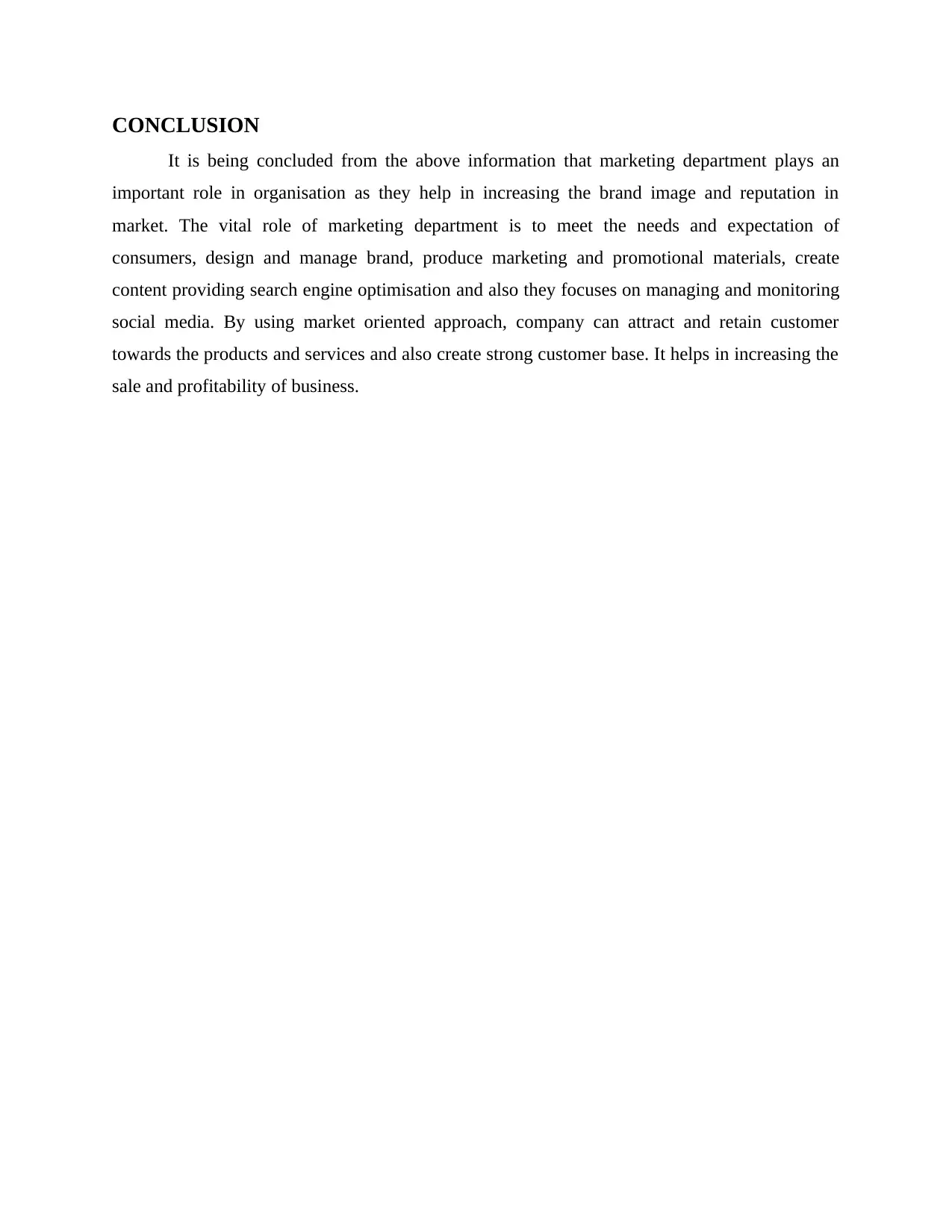
CONCLUSION
It is being concluded from the above information that marketing department plays an
important role in organisation as they help in increasing the brand image and reputation in
market. The vital role of marketing department is to meet the needs and expectation of
consumers, design and manage brand, produce marketing and promotional materials, create
content providing search engine optimisation and also they focuses on managing and monitoring
social media. By using market oriented approach, company can attract and retain customer
towards the products and services and also create strong customer base. It helps in increasing the
sale and profitability of business.
It is being concluded from the above information that marketing department plays an
important role in organisation as they help in increasing the brand image and reputation in
market. The vital role of marketing department is to meet the needs and expectation of
consumers, design and manage brand, produce marketing and promotional materials, create
content providing search engine optimisation and also they focuses on managing and monitoring
social media. By using market oriented approach, company can attract and retain customer
towards the products and services and also create strong customer base. It helps in increasing the
sale and profitability of business.
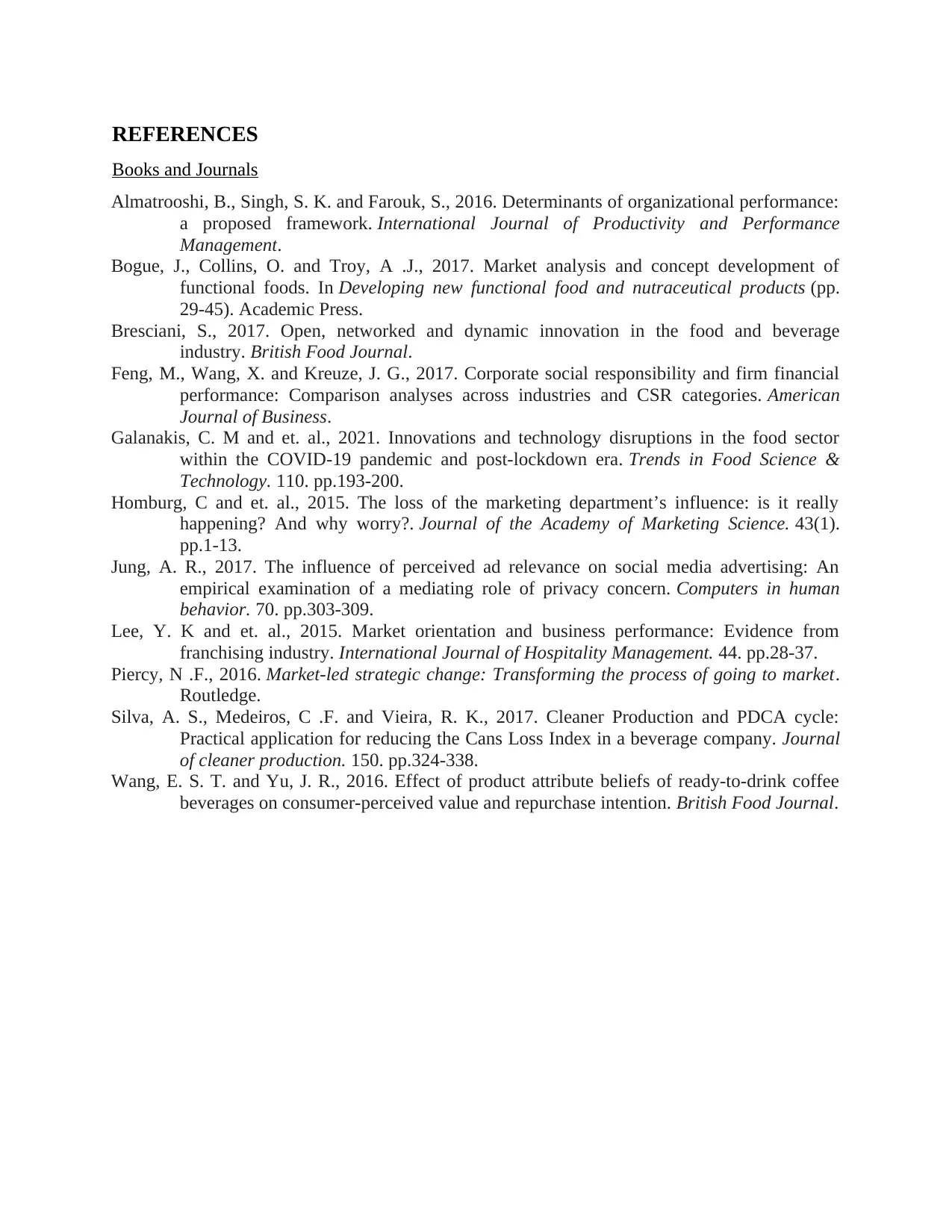
REFERENCES
Books and Journals
Almatrooshi, B., Singh, S. K. and Farouk, S., 2016. Determinants of organizational performance:
a proposed framework. International Journal of Productivity and Performance
Management.
Bogue, J., Collins, O. and Troy, A .J., 2017. Market analysis and concept development of
functional foods. In Developing new functional food and nutraceutical products (pp.
29-45). Academic Press.
Bresciani, S., 2017. Open, networked and dynamic innovation in the food and beverage
industry. British Food Journal.
Feng, M., Wang, X. and Kreuze, J. G., 2017. Corporate social responsibility and firm financial
performance: Comparison analyses across industries and CSR categories. American
Journal of Business.
Galanakis, C. M and et. al., 2021. Innovations and technology disruptions in the food sector
within the COVID-19 pandemic and post-lockdown era. Trends in Food Science &
Technology. 110. pp.193-200.
Homburg, C and et. al., 2015. The loss of the marketing department’s influence: is it really
happening? And why worry?. Journal of the Academy of Marketing Science. 43(1).
pp.1-13.
Jung, A. R., 2017. The influence of perceived ad relevance on social media advertising: An
empirical examination of a mediating role of privacy concern. Computers in human
behavior. 70. pp.303-309.
Lee, Y. K and et. al., 2015. Market orientation and business performance: Evidence from
franchising industry. International Journal of Hospitality Management. 44. pp.28-37.
Piercy, N .F., 2016. Market-led strategic change: Transforming the process of going to market.
Routledge.
Silva, A. S., Medeiros, C .F. and Vieira, R. K., 2017. Cleaner Production and PDCA cycle:
Practical application for reducing the Cans Loss Index in a beverage company. Journal
of cleaner production. 150. pp.324-338.
Wang, E. S. T. and Yu, J. R., 2016. Effect of product attribute beliefs of ready-to-drink coffee
beverages on consumer-perceived value and repurchase intention. British Food Journal.
Books and Journals
Almatrooshi, B., Singh, S. K. and Farouk, S., 2016. Determinants of organizational performance:
a proposed framework. International Journal of Productivity and Performance
Management.
Bogue, J., Collins, O. and Troy, A .J., 2017. Market analysis and concept development of
functional foods. In Developing new functional food and nutraceutical products (pp.
29-45). Academic Press.
Bresciani, S., 2017. Open, networked and dynamic innovation in the food and beverage
industry. British Food Journal.
Feng, M., Wang, X. and Kreuze, J. G., 2017. Corporate social responsibility and firm financial
performance: Comparison analyses across industries and CSR categories. American
Journal of Business.
Galanakis, C. M and et. al., 2021. Innovations and technology disruptions in the food sector
within the COVID-19 pandemic and post-lockdown era. Trends in Food Science &
Technology. 110. pp.193-200.
Homburg, C and et. al., 2015. The loss of the marketing department’s influence: is it really
happening? And why worry?. Journal of the Academy of Marketing Science. 43(1).
pp.1-13.
Jung, A. R., 2017. The influence of perceived ad relevance on social media advertising: An
empirical examination of a mediating role of privacy concern. Computers in human
behavior. 70. pp.303-309.
Lee, Y. K and et. al., 2015. Market orientation and business performance: Evidence from
franchising industry. International Journal of Hospitality Management. 44. pp.28-37.
Piercy, N .F., 2016. Market-led strategic change: Transforming the process of going to market.
Routledge.
Silva, A. S., Medeiros, C .F. and Vieira, R. K., 2017. Cleaner Production and PDCA cycle:
Practical application for reducing the Cans Loss Index in a beverage company. Journal
of cleaner production. 150. pp.324-338.
Wang, E. S. T. and Yu, J. R., 2016. Effect of product attribute beliefs of ready-to-drink coffee
beverages on consumer-perceived value and repurchase intention. British Food Journal.
⊘ This is a preview!⊘
Do you want full access?
Subscribe today to unlock all pages.

Trusted by 1+ million students worldwide
1 out of 9
Related Documents
Your All-in-One AI-Powered Toolkit for Academic Success.
+13062052269
info@desklib.com
Available 24*7 on WhatsApp / Email
![[object Object]](/_next/static/media/star-bottom.7253800d.svg)
Unlock your academic potential
Copyright © 2020–2026 A2Z Services. All Rights Reserved. Developed and managed by ZUCOL.




